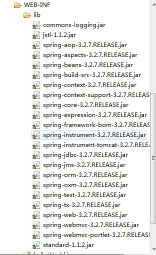1.【转】spring MVC入门示例(hello world demo)
1. Spring MVC介绍
Spring Web MVC是一种基于Java的实现了Web MVC设计模式的请求驱动类型的轻量级Web框架,即使用了MVC架构模式的思想,将web层进行职责解耦,基于请求驱动指的就是使用请求-响应模型,框架的目的就是帮助我们简化开发,Spring Web MVC也是要简化我们日常Web开发的。
Spring Web MVC也是服务到工作者模式的实现,但进行可优化。前端控制器是DispatcherServlet;应用控制器其实拆为处理器映射器(Handler Mapping)进行处理器管理和视图解析器(View Resolver)进行视图管理;页面控制器/动作/处理器为Controller接口(仅包含ModelAndView handleRequest(request, response) 方法)的实现(也可以是任何的POJO类);支持本地化(Locale)解析、主题(Theme)解析及文件上传等;提供了非常灵活的数据验证、格式化和数据绑定机制;提供了强大的约定大于配置(惯例优先原则)的契约式编程支持。
2. Spring MVC的优点
- 让我们能非常简单的设计出干净的Web层和薄薄的Web层;
- 进行更简洁的Web层的开发;
- 天生与Spring框架集成(如IoC容器、AOP等);
- 提供强大的约定大于配置的契约式编程支持;
- 能简单的进行Web层的单元测试;
- 支持灵活的URL到页面控制器的映射;
- 非常容易与其他视图技术集成,如Velocity、FreeMarker等等,因为模型数据不放在特定的API里,而是放在一个Model里(
Map数据结构实现,因此很容易被其他框架使用); - 非常灵活的数据验证、格式化和数据绑定机制,能使用任何对象进行数据绑定,不必实现特定框架的API;
- 提供一套强大的JSP标签库,简化JSP开发;
- 支持灵活的本地化、主题等解析;
- 更加简单的异常处理;
- 对静态资源的支持;
- 支持Restful风格。
2. 环境配置
新建一个web工程,file->new->web project,取名为SpringMVC。将spring中的jar中复制到SpringMVC/WEB-INF/lib下。spring中有些与struts相关的包可以不复制,因为这里用不到。除此之外,还需要
commons-logging.jar/jstl.jar/standard.jar这三个依赖包。配置完后,lib下的jar包如下所示:

3. 入门示例
3.1 我们首先从web.xml开始配置。
|
1
2
3
4
5
6
7
8
9
10
11
12
13
14
15
16
17
18
19
20
21
22
|
<?xml version="1.0" encoding="UTF-8"?><web-app version="2.5" xmlns="http://java.sun.com/xml/ns/javaee" xmlns:xsi="http://www.w3.org/2001/XMLSchema-instance" xsi:schemaLocation="http://java.sun.com/xml/ns/javaee http://java.sun.com/xml/ns/javaee/web-app_2_5.xsd"> <display-name>SpringMVC</display-name> <servlet> <servlet-name>SpringMVC</servlet-name> <servlet-class>org.springframework.web.servlet.DispatcherServlet</servlet-class> <load-on-startup>1</load-on-startup> </servlet> <servlet-mapping> <servlet-name>SpringMVC</servlet-name> <url-pattern>/</url-pattern> </servlet-mapping> <welcome-file-list> <welcome-file>MyJsp.jsp</welcome-file> </welcome-file-list></web-app> |
load-on-startup:表示启动容器时初始化该Servlet;
url-pattern:表示哪些请求交给Spring Web MVC处理, “/” 是用来定义默认servlet映射的。也可以如“*.html”表示拦截所有以html为扩展名的请求。
自此请求已交给Spring Web MVC框架处理,因此我们需要配置Spring的配置文件,默认DispatcherServlet会加载WEB-INF/[DispatcherServlet的Servlet名字]-servlet.xml配置文件。本示例为WEB-INF/ SpringMVC-servlet.xml。
3.2 再来配置SpringMVC-servlet.xml
|
1
2
3
4
5
6
7
8
9
10
11
12
13
14
15
16
17
18
19
20
21
22
23
|
<?xml version="1.0" encoding="UTF-8"?><beans xmlns="http://www.springframework.org/schema/beans" xmlns:xsi="http://www.w3.org/2001/XMLSchema-instance" xmlns:p="http://www.springframework.org/schema/p" xmlns:context="http://www.springframework.org/schema/context" xmlns:mvc="http://www.springframework.org/schema/mvc" xsi:schemaLocation=" http://www.springframework.org/schema/beans http://www.springframework.org/schema/beans/spring-beans-3.0.xsd http://www.springframework.org/schema/context http://www.springframework.org/schema/context/spring-context-3.0.xsd http://www.springframework.org/schema/mvc http://www.springframework.org/schema/mvc/spring-mvc-3.0.xsd"> <bean name="/test1/helloWorld" class="com.SpringMVC.web.controller.HelloWorldController" /> <!-- ViewResolver --> <bean id="viewResolver" class="org.springframework.web.servlet.view.InternalResourceViewResolver"> <property name="prefix" value="/WEB-INF"/> <property name="suffix" value=".jsp"/> </bean> </beans> |
InternalResourceViewResolver:用于支持Servlet、JSP视图解析;
prefix和suffix:查找视图页面的前缀和后缀(前缀[逻辑视图名]后缀),比如传进来的逻辑视图名为hello,则该jsp视图页面应该存放在“WEB-INF/hello.jsp”;
<bean name="test1/helloWorld" ... />这里表示传来的url与代码中的controller的对应关系。
3.3 下面我们来写controller类代码
|
1
2
3
4
5
6
7
8
9
10
11
12
13
14
15
16
17
18
|
package com.SpringMVC.web.controller;import javax.servlet.http.HttpServletRequest;import javax.servlet.http.HttpServletResponse;import org.springframework.web.servlet.ModelAndView;import org.springframework.web.servlet.mvc.Controller;public class HelloWorldController implements Controller{ public ModelAndView handleRequest(HttpServletRequest arg0, HttpServletResponse arg1) throws Exception { // TODO Auto-generated method stub System.out.println("--------------hello world! 世界你好!--------------------"); return new ModelAndView("/helloWorld"); }} |
这里实现了一个接口,重写了其中的handleRequest函数。函数中,在后台打印一段文件,并将helloWorld.jsp页面返回给浏览器。因为在-servlet.xml中进行了配置,所以helloWorld.jsp文件应在WEB-INF文件夹下,且此处返回时仅写helloWorld即可,无需加后缀.jsp。
3.4 jsp页面
|
1
2
3
4
5
6
7
8
9
10
11
12
13
14
15
16
17
18
19
20
21
22
23
24
|
String path = request.getContextPath();String basePath = request.getScheme()+"://"+request.getServerName()+":"+request.getServerPort()+path+"/";%><!DOCTYPE HTML PUBLIC "-//W3C//DTD HTML 4.01 Transitional//EN"><html> <head> <base href="<%=basePath%>"> <title>Hello World!</title> <meta http-equiv="pragma" content="no-cache"> <meta http-equiv="cache-control" content="no-cache"> <meta http-equiv="expires" content="0"> <meta http-equiv="keywords" content="keyword1,keyword2,keyword3"> <meta http-equiv="description" content="This is my page"> <!-- <link rel="stylesheet" type="text/css" href="styles.css"> --> </head> <body> -----------------Hello World! ----------------------<br> </body></html> |
3.5 完成后的目录结构
|
1
2
3
4
5
6
7
8
9
10
|
SpringMVC src com.SpringMVC.web.controller HelloWorldController.java WebRoot WEB-INF lib helloWorld.jsp SpringMVC-servlet.xml web.xml |
5. 运行、访问页面
将SpringMVC部署到tomcat服务器上,运行。在浏览器中输入访问地址:http://localhost:8080/SpringMVC/test1/helloWorld。应该就可以看到前台显示helloWorld.jsp页面,后台打印“--------------hello world! 世界你好!--------------------”字符串了。


 浙公网安备 33010602011771号
浙公网安备 33010602011771号